ITECH2300: Wireless Communication Assignment 1 - Modulation Analysis
VerifiedAdded on 2023/01/04
|16
|1797
|77
Homework Assignment
AI Summary
This document presents a comprehensive solution to an ITECH2300 Mobile Network & Wireless Communication assignment. The assignment comprises two main parts. Part A focuses on digital modulation techniques, requiring the student to encode a given bit pattern (01001) using Amplitude Shift Keying (ASK), Frequency Shift Keying (FSK), and Phase Shift Keying (PSK) and to draw the resulting waveforms. It also includes an analysis of signal parameters. Part B involves a comparison between ADSL2+ routers and cable modem routers, analyzing their modulation types (DMT vs. QPSK), error control strategies, bit rates, and other features. The student provides Matlab code to generate the ASK, FSK, and PSK waveforms for the given bit pattern. Furthermore, the document provides a comparison of ADSL2+ and cable modem routers discussing their modulation techniques, bit rates, and port availability. The document concludes with a recommendation for the preferred router based on the analysis.

Name of the Student
Name of the University
Author Note
Name of the University
Author Note
Paraphrase This Document
Need a fresh take? Get an instant paraphrase of this document with our AI Paraphraser
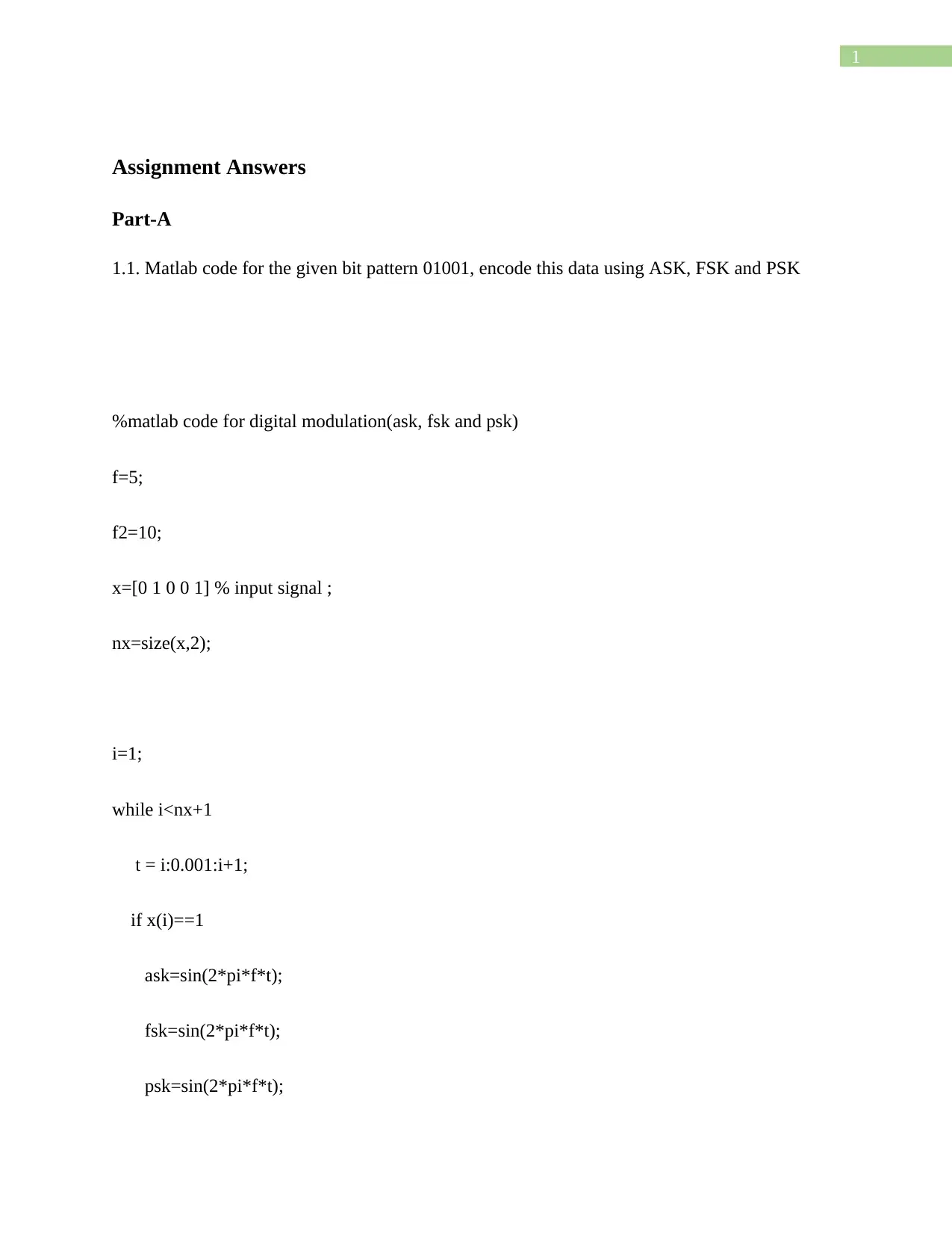
1
Assignment Answers
Part-A
1.1. Matlab code for the given bit pattern 01001, encode this data using ASK, FSK and PSK
%matlab code for digital modulation(ask, fsk and psk)
f=5;
f2=10;
x=[0 1 0 0 1] % input signal ;
nx=size(x,2);
i=1;
while i<nx+1
t = i:0.001:i+1;
if x(i)==1
ask=sin(2*pi*f*t);
fsk=sin(2*pi*f*t);
psk=sin(2*pi*f*t);
Assignment Answers
Part-A
1.1. Matlab code for the given bit pattern 01001, encode this data using ASK, FSK and PSK
%matlab code for digital modulation(ask, fsk and psk)
f=5;
f2=10;
x=[0 1 0 0 1] % input signal ;
nx=size(x,2);
i=1;
while i<nx+1
t = i:0.001:i+1;
if x(i)==1
ask=sin(2*pi*f*t);
fsk=sin(2*pi*f*t);
psk=sin(2*pi*f*t);
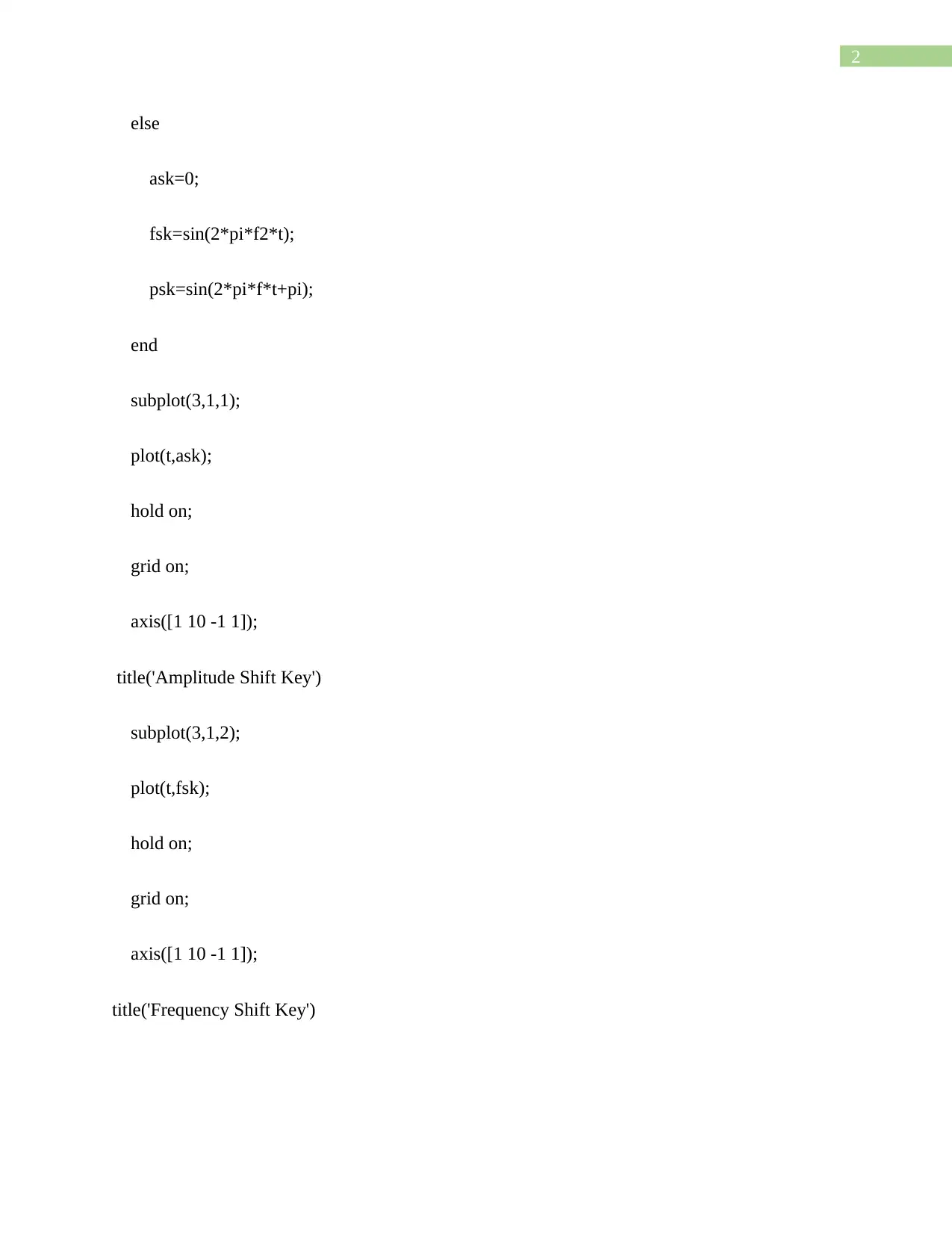
2
else
ask=0;
fsk=sin(2*pi*f2*t);
psk=sin(2*pi*f*t+pi);
end
subplot(3,1,1);
plot(t,ask);
hold on;
grid on;
axis([1 10 -1 1]);
title('Amplitude Shift Key')
subplot(3,1,2);
plot(t,fsk);
hold on;
grid on;
axis([1 10 -1 1]);
title('Frequency Shift Key')
else
ask=0;
fsk=sin(2*pi*f2*t);
psk=sin(2*pi*f*t+pi);
end
subplot(3,1,1);
plot(t,ask);
hold on;
grid on;
axis([1 10 -1 1]);
title('Amplitude Shift Key')
subplot(3,1,2);
plot(t,fsk);
hold on;
grid on;
axis([1 10 -1 1]);
title('Frequency Shift Key')
⊘ This is a preview!⊘
Do you want full access?
Subscribe today to unlock all pages.

Trusted by 1+ million students worldwide
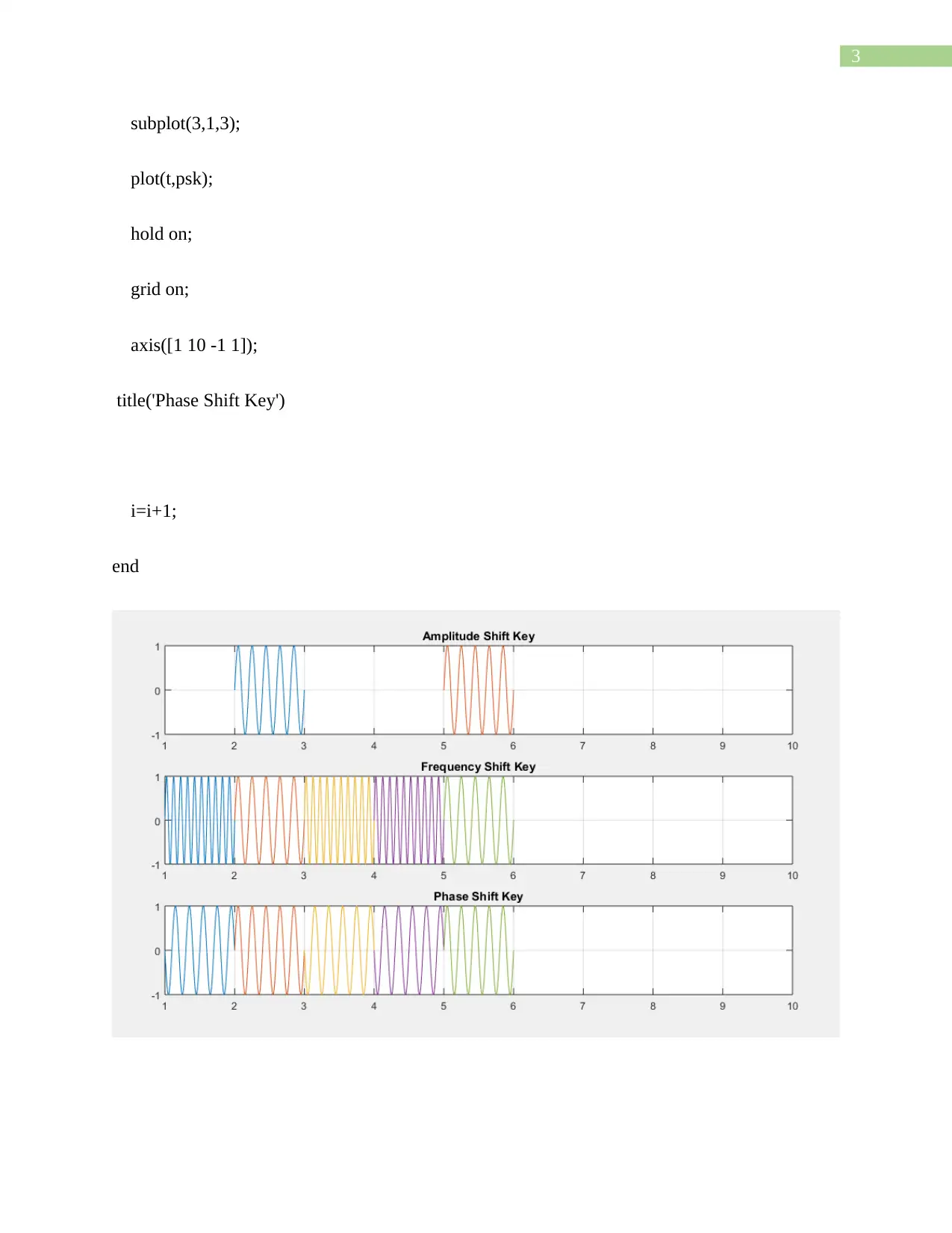
3
subplot(3,1,3);
plot(t,psk);
hold on;
grid on;
axis([1 10 -1 1]);
title('Phase Shift Key')
i=i+1;
end
subplot(3,1,3);
plot(t,psk);
hold on;
grid on;
axis([1 10 -1 1]);
title('Phase Shift Key')
i=i+1;
end
Paraphrase This Document
Need a fresh take? Get an instant paraphrase of this document with our AI Paraphraser

4
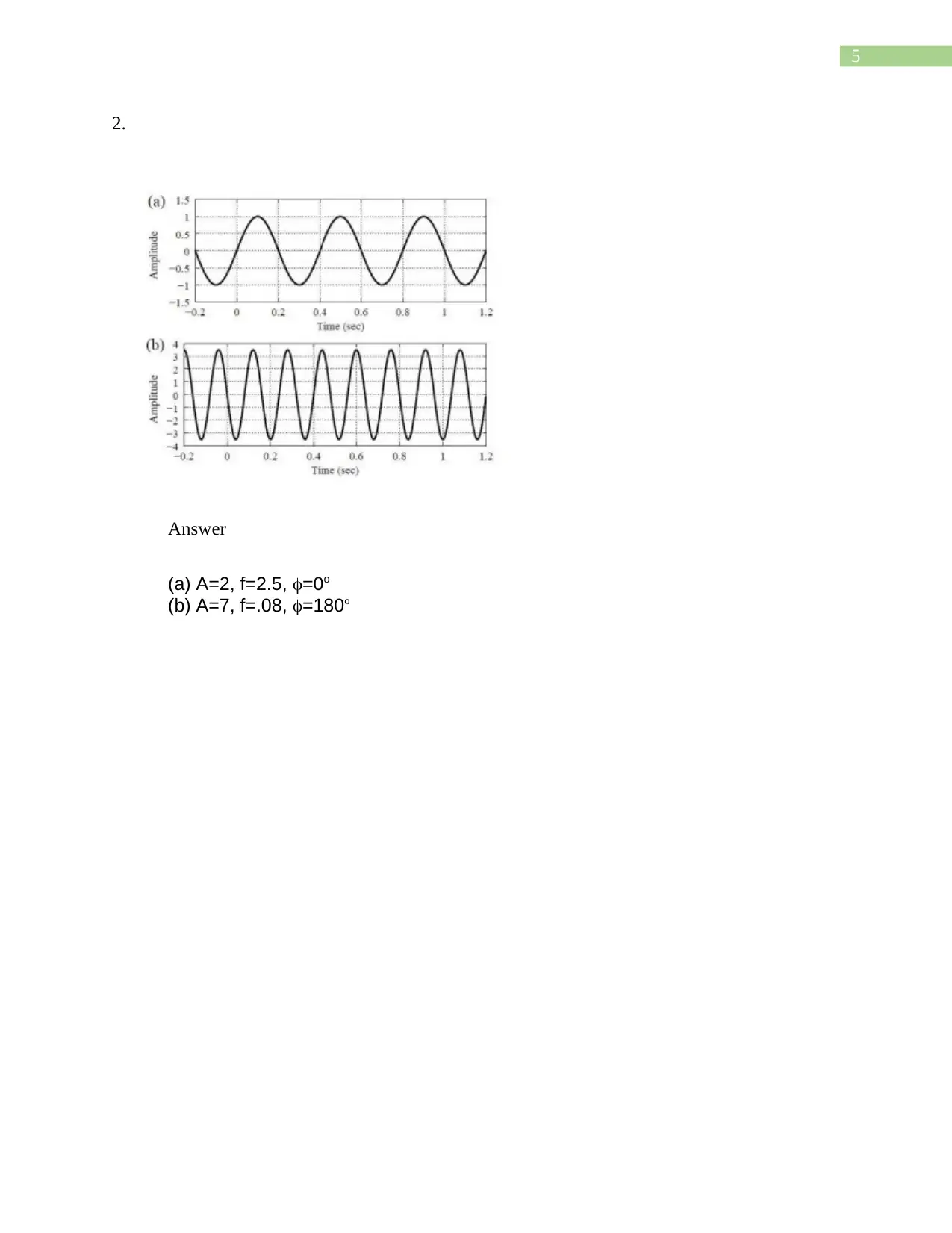
5
2.
Answer
(a) A=2, f=2.5, =0o
(b) A=7, f=.08, =180o
2.
Answer
(a) A=2, f=2.5, =0o
(b) A=7, f=.08, =180o
⊘ This is a preview!⊘
Do you want full access?
Subscribe today to unlock all pages.

Trusted by 1+ million students worldwide
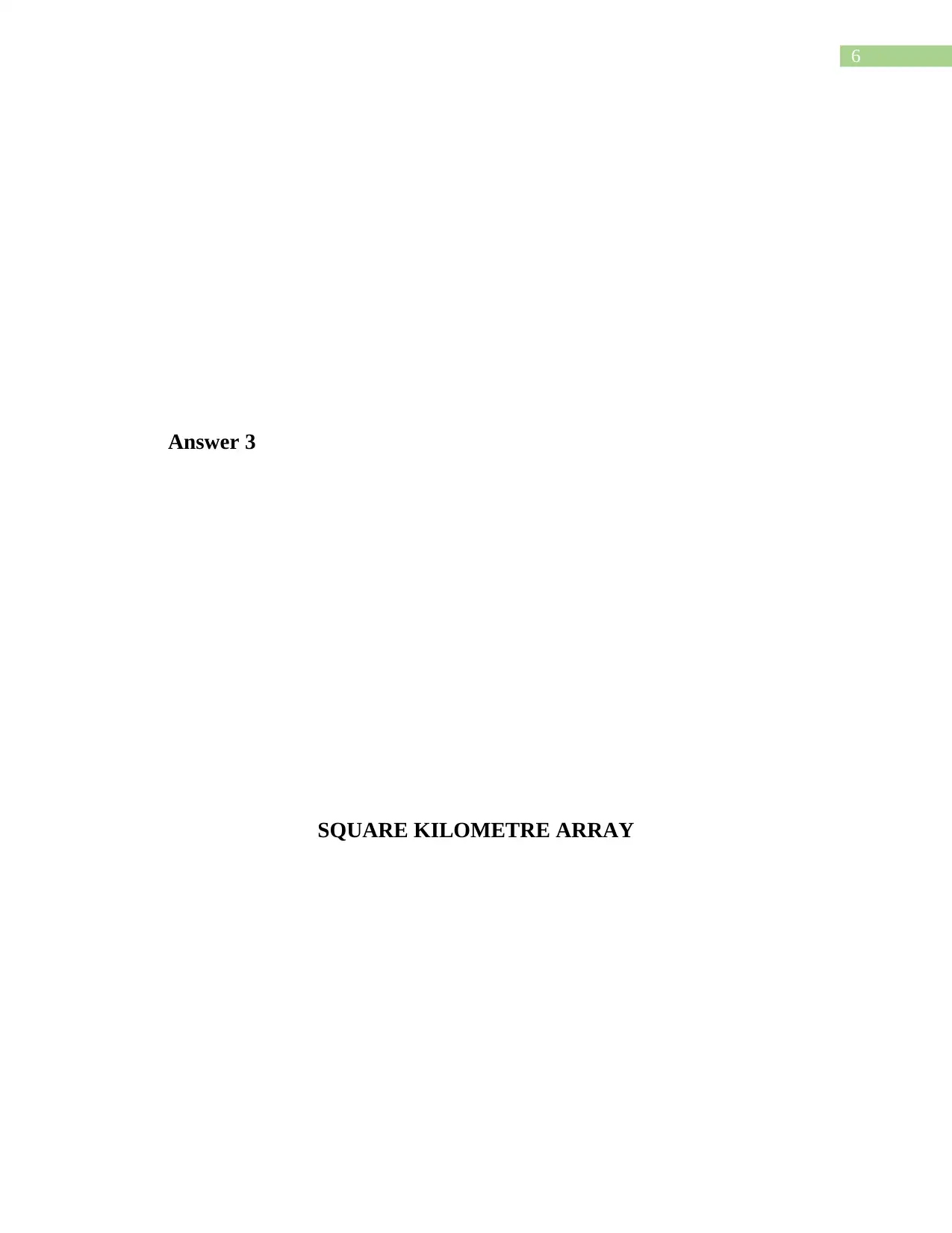
6
Answer 3
SQUARE KILOMETRE ARRAY
Answer 3
SQUARE KILOMETRE ARRAY
Paraphrase This Document
Need a fresh take? Get an instant paraphrase of this document with our AI Paraphraser
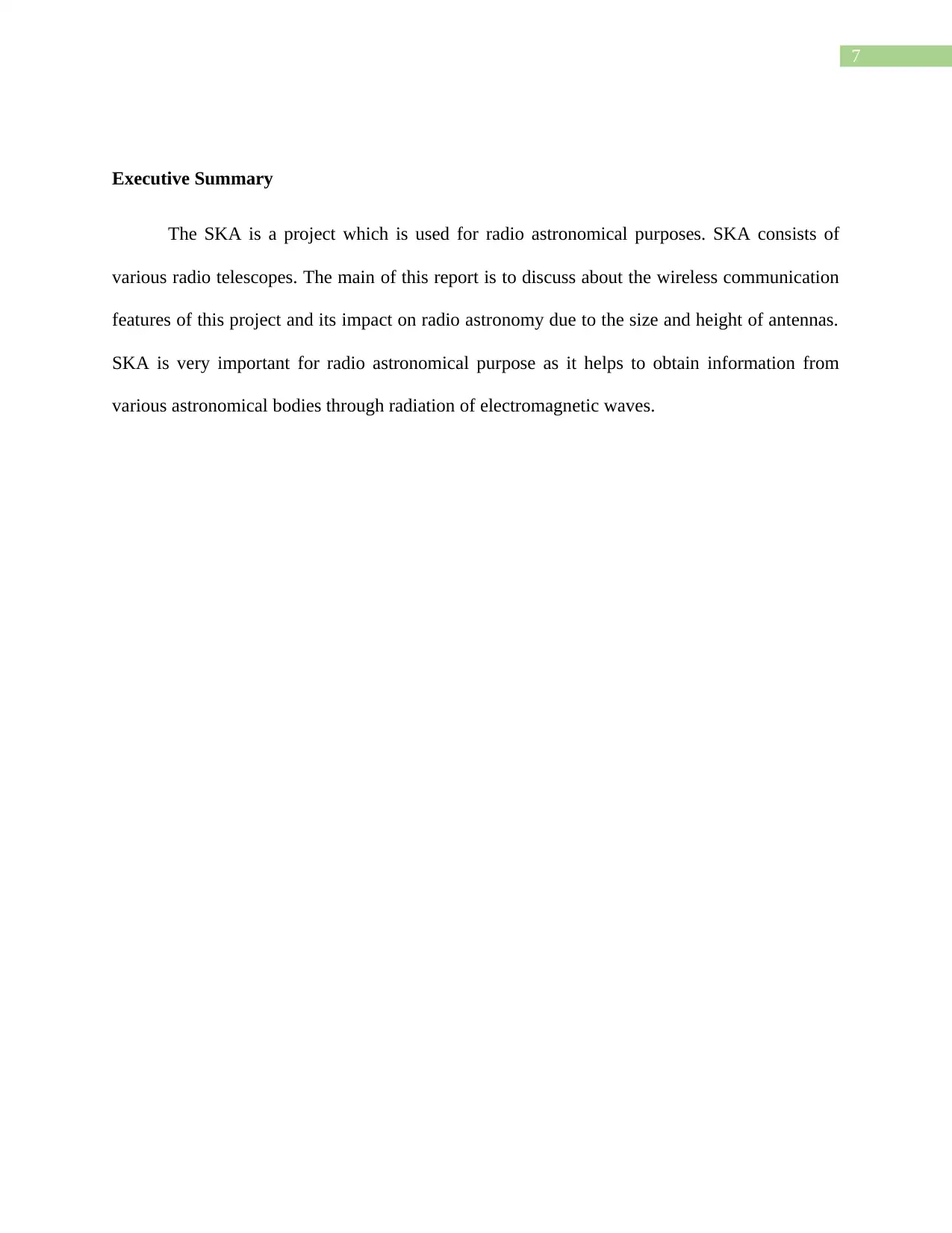
7
Executive Summary
The SKA is a project which is used for radio astronomical purposes. SKA consists of
various radio telescopes. The main of this report is to discuss about the wireless communication
features of this project and its impact on radio astronomy due to the size and height of antennas.
SKA is very important for radio astronomical purpose as it helps to obtain information from
various astronomical bodies through radiation of electromagnetic waves.
Executive Summary
The SKA is a project which is used for radio astronomical purposes. SKA consists of
various radio telescopes. The main of this report is to discuss about the wireless communication
features of this project and its impact on radio astronomy due to the size and height of antennas.
SKA is very important for radio astronomical purpose as it helps to obtain information from
various astronomical bodies through radiation of electromagnetic waves.
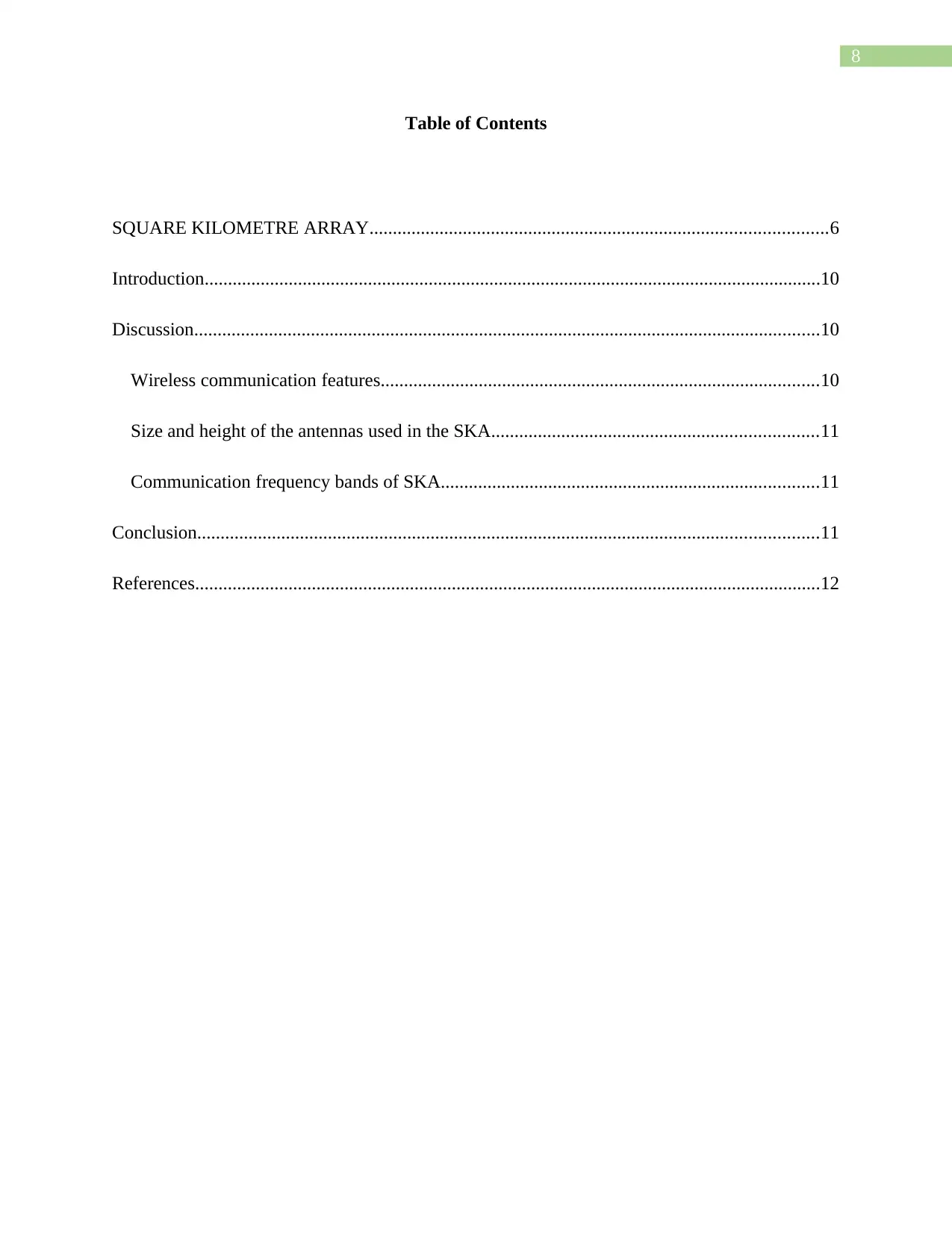
8
Table of Contents
SQUARE KILOMETRE ARRAY..................................................................................................6
Introduction....................................................................................................................................10
Discussion......................................................................................................................................10
Wireless communication features..............................................................................................10
Size and height of the antennas used in the SKA......................................................................11
Communication frequency bands of SKA.................................................................................11
Conclusion.....................................................................................................................................11
References......................................................................................................................................12
Table of Contents
SQUARE KILOMETRE ARRAY..................................................................................................6
Introduction....................................................................................................................................10
Discussion......................................................................................................................................10
Wireless communication features..............................................................................................10
Size and height of the antennas used in the SKA......................................................................11
Communication frequency bands of SKA.................................................................................11
Conclusion.....................................................................................................................................11
References......................................................................................................................................12
⊘ This is a preview!⊘
Do you want full access?
Subscribe today to unlock all pages.

Trusted by 1+ million students worldwide
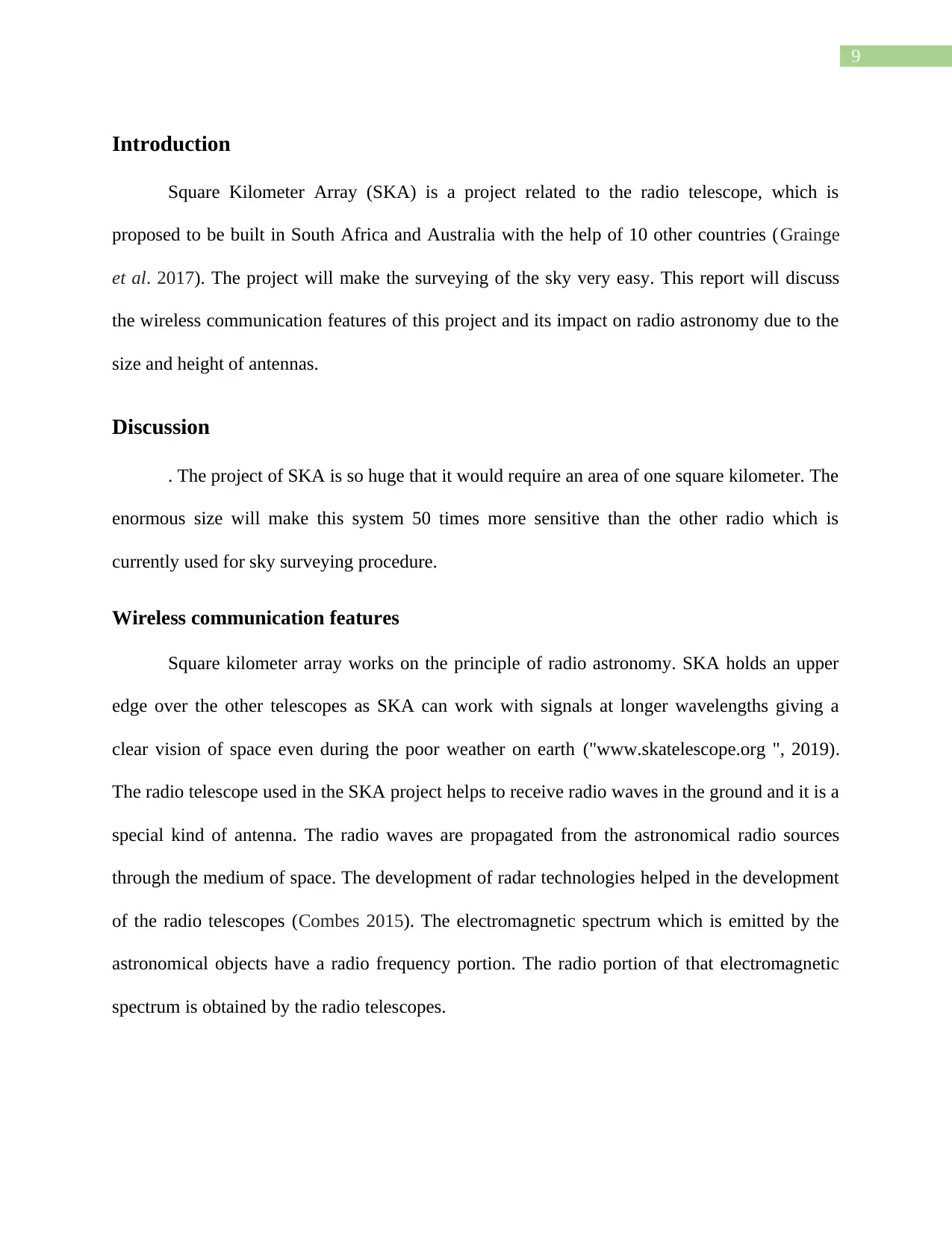
9
Introduction
Square Kilometer Array (SKA) is a project related to the radio telescope, which is
proposed to be built in South Africa and Australia with the help of 10 other countries (Grainge
et al. 2017). The project will make the surveying of the sky very easy. This report will discuss
the wireless communication features of this project and its impact on radio astronomy due to the
size and height of antennas.
Discussion
. The project of SKA is so huge that it would require an area of one square kilometer. The
enormous size will make this system 50 times more sensitive than the other radio which is
currently used for sky surveying procedure.
Wireless communication features
Square kilometer array works on the principle of radio astronomy. SKA holds an upper
edge over the other telescopes as SKA can work with signals at longer wavelengths giving a
clear vision of space even during the poor weather on earth ("www.skatelescope.org ", 2019).
The radio telescope used in the SKA project helps to receive radio waves in the ground and it is a
special kind of antenna. The radio waves are propagated from the astronomical radio sources
through the medium of space. The development of radar technologies helped in the development
of the radio telescopes (Combes 2015). The electromagnetic spectrum which is emitted by the
astronomical objects have a radio frequency portion. The radio portion of that electromagnetic
spectrum is obtained by the radio telescopes.
Introduction
Square Kilometer Array (SKA) is a project related to the radio telescope, which is
proposed to be built in South Africa and Australia with the help of 10 other countries (Grainge
et al. 2017). The project will make the surveying of the sky very easy. This report will discuss
the wireless communication features of this project and its impact on radio astronomy due to the
size and height of antennas.
Discussion
. The project of SKA is so huge that it would require an area of one square kilometer. The
enormous size will make this system 50 times more sensitive than the other radio which is
currently used for sky surveying procedure.
Wireless communication features
Square kilometer array works on the principle of radio astronomy. SKA holds an upper
edge over the other telescopes as SKA can work with signals at longer wavelengths giving a
clear vision of space even during the poor weather on earth ("www.skatelescope.org ", 2019).
The radio telescope used in the SKA project helps to receive radio waves in the ground and it is a
special kind of antenna. The radio waves are propagated from the astronomical radio sources
through the medium of space. The development of radar technologies helped in the development
of the radio telescopes (Combes 2015). The electromagnetic spectrum which is emitted by the
astronomical objects have a radio frequency portion. The radio portion of that electromagnetic
spectrum is obtained by the radio telescopes.
Paraphrase This Document
Need a fresh take? Get an instant paraphrase of this document with our AI Paraphraser
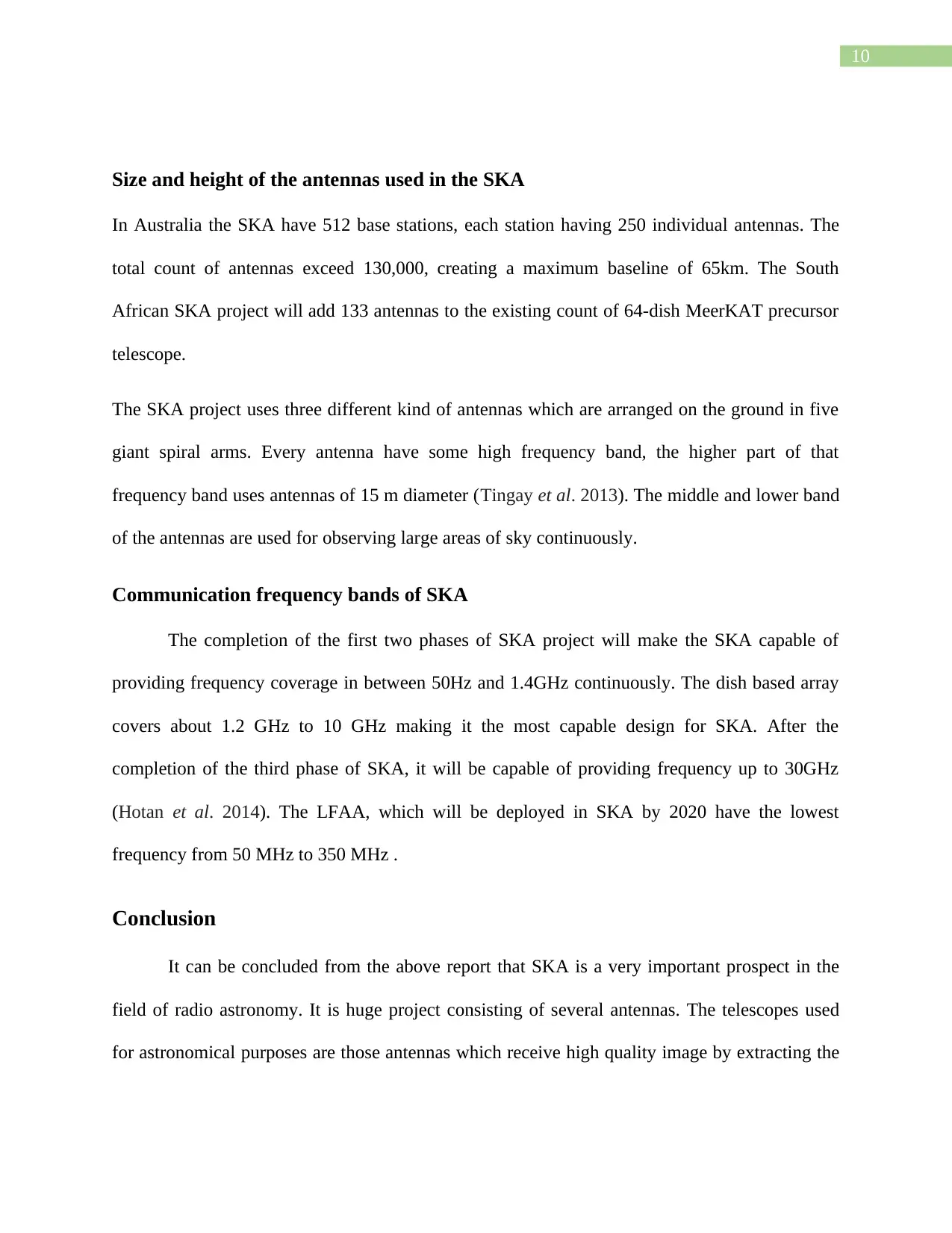
10
Size and height of the antennas used in the SKA
In Australia the SKA have 512 base stations, each station having 250 individual antennas. The
total count of antennas exceed 130,000, creating a maximum baseline of 65km. The South
African SKA project will add 133 antennas to the existing count of 64-dish MeerKAT precursor
telescope.
The SKA project uses three different kind of antennas which are arranged on the ground in five
giant spiral arms. Every antenna have some high frequency band, the higher part of that
frequency band uses antennas of 15 m diameter (Tingay et al. 2013). The middle and lower band
of the antennas are used for observing large areas of sky continuously.
Communication frequency bands of SKA
The completion of the first two phases of SKA project will make the SKA capable of
providing frequency coverage in between 50Hz and 1.4GHz continuously. The dish based array
covers about 1.2 GHz to 10 GHz making it the most capable design for SKA. After the
completion of the third phase of SKA, it will be capable of providing frequency up to 30GHz
(Hotan et al. 2014). The LFAA, which will be deployed in SKA by 2020 have the lowest
frequency from 50 MHz to 350 MHz .
Conclusion
It can be concluded from the above report that SKA is a very important prospect in the
field of radio astronomy. It is huge project consisting of several antennas. The telescopes used
for astronomical purposes are those antennas which receive high quality image by extracting the
Size and height of the antennas used in the SKA
In Australia the SKA have 512 base stations, each station having 250 individual antennas. The
total count of antennas exceed 130,000, creating a maximum baseline of 65km. The South
African SKA project will add 133 antennas to the existing count of 64-dish MeerKAT precursor
telescope.
The SKA project uses three different kind of antennas which are arranged on the ground in five
giant spiral arms. Every antenna have some high frequency band, the higher part of that
frequency band uses antennas of 15 m diameter (Tingay et al. 2013). The middle and lower band
of the antennas are used for observing large areas of sky continuously.
Communication frequency bands of SKA
The completion of the first two phases of SKA project will make the SKA capable of
providing frequency coverage in between 50Hz and 1.4GHz continuously. The dish based array
covers about 1.2 GHz to 10 GHz making it the most capable design for SKA. After the
completion of the third phase of SKA, it will be capable of providing frequency up to 30GHz
(Hotan et al. 2014). The LFAA, which will be deployed in SKA by 2020 have the lowest
frequency from 50 MHz to 350 MHz .
Conclusion
It can be concluded from the above report that SKA is a very important prospect in the
field of radio astronomy. It is huge project consisting of several antennas. The telescopes used
for astronomical purposes are those antennas which receive high quality image by extracting the

11
electromagnetic spectrum from the received wave coming from the astronomical objects. The
project is still in research and development phase.
electromagnetic spectrum from the received wave coming from the astronomical objects. The
project is still in research and development phase.
⊘ This is a preview!⊘
Do you want full access?
Subscribe today to unlock all pages.

Trusted by 1+ million students worldwide
1 out of 16
Your All-in-One AI-Powered Toolkit for Academic Success.
+13062052269
info@desklib.com
Available 24*7 on WhatsApp / Email
![[object Object]](/_next/static/media/star-bottom.7253800d.svg)
Unlock your academic potential
Copyright © 2020–2026 A2Z Services. All Rights Reserved. Developed and managed by ZUCOL.

